CenPEG’s 2013 summer practicum:
‘A life-changing experience’
CenPEG.org
June 17, 2013
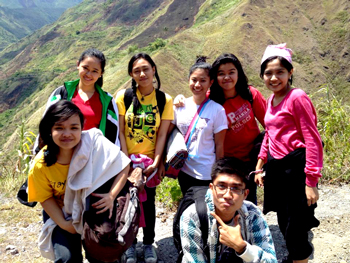
En route to Dananao village
From a book launch, to hiking on mountain trails and payao (rice paddies), immersing among workers and, finally, election watch volunteering. This is how 12 political science students from the University of the Philippines (UP) in Manila and another from the university’s Diliman campus (college of education) spent summer this year.
The 13 students enlisted under CenPEG’s Volunteer Integration Program (VIP) with academic credits from April 19 – May 21, 2013. The summer practicum was the eighth since the VIP program was launched by CenPEG in 2005, a year after its founding. Previous summer practicum and NSTP students also came from UP Diliman and Los Banos, De La Salle University, and other schools.
This year’s corps of summer interns served as documenters and volunteer secretariat in the back-to-back launching on April 10 of two books on Philippine elections, namely, Was Your Vote Counted? Unveiling the Myths about Philippine Automated Elections, and Hacking Our Democracy. The first book was authored by contributing writers from CenPEG and the election watchdog Automated Election System Watch (AES Watch) and the second by newspaper columnist Rene B. Azurin. The two books were launched at the Ateneo Professionals School, Rockwell, Makati.
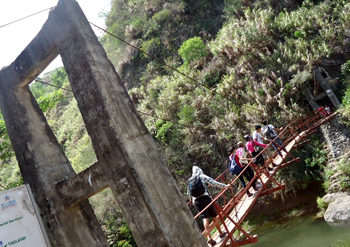
Crossing the bridge on foot
They also acted as volunteer staff in a press conference announcing the filing of a Petition against the Commission on Elections (Comelec) through the Philippine government by 34 individual petitioners before the United Nations Human Rights Committee (UNHRC). Citing Article 25 (right of suffrage) of the International Convention on Civil and Political Rights (ICCPR), the Petition (or Communication) led by former Vice President Teofisto T. Guingona, Jr., charged the Comelec, among others, of violating the right of Filipino voters to transparency in the counting of votes, hence, an infringement of the sovereign will of the people. The UNHRC is based in Geneva, Switzerland. Acting on landmark human rights petitions and cases during the Macapagal-Arroyo presidency (2001-2010), the UN Secretary General was compelled to send fact-finding missions in the Philippines led by UN Rapporteur Philip Alston to probe the accountability of the national government in the summary executions of progressive activists. The Supreme Court (SC) then led by Chief Justice Reynato Puno was likewise compelled to invoke judicial intervention by issuing the writs of amparo and of habeas data.

The payao (rice paddies) culture defines the upland Kalinga village
On Labor Day May 1, the students joined thousands of workers and people’s organizations in a march rally at the Liwasang Bonifacio, Manila that culminated in Mendiola. The interns’ immersion was preceded by a briefing on the country’s labor situation led by an education officer from the Crispin Beltran Resource Center.
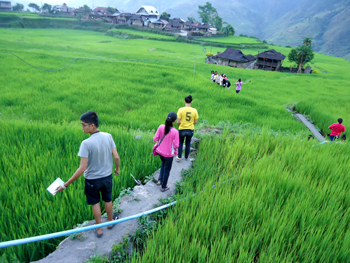
After 4 hours of hiking, student volunteers trek down to Dananao village
Highlight of the monitoring was a press conference of AES Watch on May 18 which assessed the mid-term election as “worse than in 2010). The SRO-attended press conference, held at the AES Watch monitoring center, ended with a skit dramatizing how the election was blundered by Comelec chairman Sixto Brillantes, Jr., and Smartmatic’s super-salesman Cesar Flores.
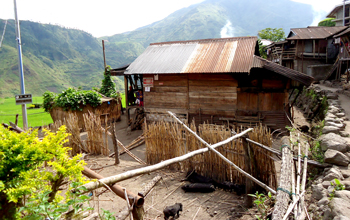
A poor Kalinga peasant family's hut invites student interns
All activities of the summer practicum were integrated under a policy research program where the students learned practice-based theoretical frameworks, field research methodologies, checklist-guided informal surveys, and participative research through community immersion and observation. As teams and collective batch, the students did researches and reports on, among others, the indigenous people’s and other sectors’ observations on the automated election, an SC mandamus petition filed by senatorial candidate Richard Gordon, the May 10 picket-rally before Comelec, summary of election incidents, and political dynasties after the May 13 elections. The incident reports updated AES Watch’s IT and political analysts especially for media interviews. The reports also served as database for investigating the “60-30-10 pattern” observed in the election outcome, will form part of a final assessment report on the 2013 mid-term elections to be released by CenPEG before the end of the year.
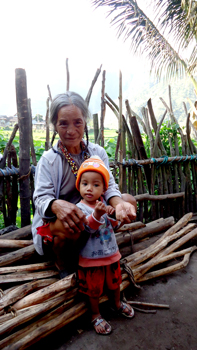
Childcare: A way of life for Kalinga women
All the student interns received certificates of completion on May 21. The event was attended by CenPEG Board chair Temy Rivera, former Board chair Bien Lumbera, Vice Chair Roland Simbulan, CenPEG executive staff led by Evita L. Jimenez, and Prof. Malou Nicolas, head of CIDS.
CenPEG’s summer practicum was described by the interns as: a “mix of utmost fun and excitement,” “very rewarding,” an “all-rounded experience,” “fulfilling,” and “building confidence, balancing immersion with research.” Some called it “very organized and systematic,” “strictly adheres to schedule,” “emphasized the importance of group dynamics,” “a good training for research” where one learns work ethics and interaction with people. Another called it a “life-changing experience” liberating oneself from a “comfort zone” of indecisiveness and individual selfishness.
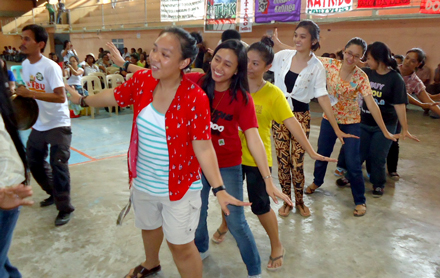
Interns try the local Kalinga sakpaya dance
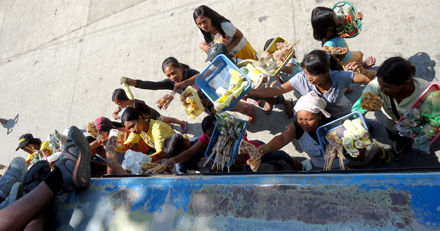
For the wayward traveller: Delicacies and water from Tabuk all-women vendors
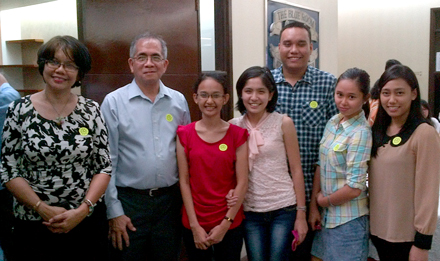
April 10 book launch in Makati: UP Manila summer interns pose with CenPEG people
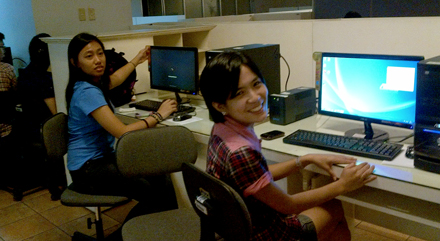
All set: Practicum team coordinators Kristine (left) and Marielle at the AES Watch poll monitor center
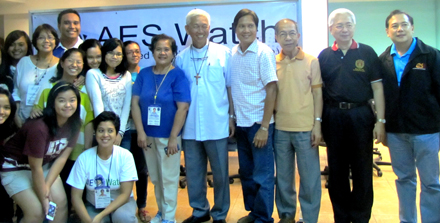
Photo break with UP President Alfredo Pascual (second from right) with AES Watch co-convener Bp. Broderick Pabillo, Prof. Ferdie Llanes of UP Padayon, Dr. Temy Rivera, and Prof. Nelson Celis. Second from left, standing, is CenPEG executive director Evi Jimenez.
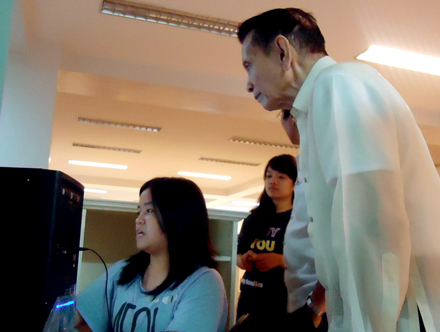
Former Vice President Teofisto Guingona, Jr., AES Watch honorary chair listens to volunteer Kathleen how the poll monitor works
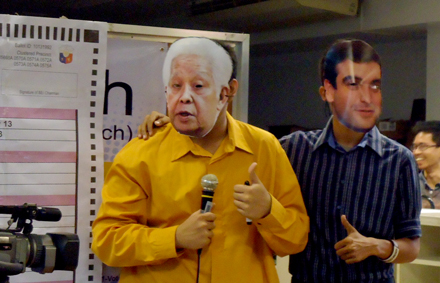
"Comelec chairman Sixto Brillantes, Jr." and "Smartmatic super salesman Cesar Flores" surprise May 18 press conference
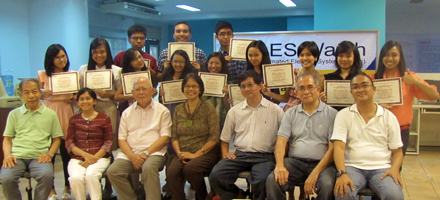
Completion Day (May 21): Summer interns show with pride their certificates of completion. Seated (l-r): CenPEG Board chairman Temy Rivera, CIDS head Prof. Malou Nicolas, National Artist and former CenPEG chair Bien Lumbera, Roland Simbulan, Evi Jimenez, Bobby Tuazon, and summer practicum coordinator Fidel dela Torre.
- The First Year of Marcos Jr.
- The US global war machine in the PH
- Marcos State Visit to US Firms up Overall Ties; Administration Ruling Coalition Faces Discord
- Marcos, Jr.’s pivot to the U.S. deepens
- South China Sea tops Biden-Marcos summit
- Philippines split over increased U.S. military presence
- China-Russia ties on high note
- What are geopolitical implications of U.S. defense chief's visit to the Philippines?
- Configuring Philippines-China ties under Marcos, Jr.; Philippine Development Plan and controversial funds
- Is there prospect for the hybrid election system (HES)?
- MARCOS, JR. FACES GRINDING WOES; ARE REFORMS POSSIBLE?
- Marcos, Jr. pivots to the US; faces tough economic challenges
- CenPEG’s 16th book launched
- Sisa’s Vengeance: Jose Rizal’s Sexual Politics & Cultural Revolution
- Marcos, Jr. in cryptic ties with China as he commits to U.S. defense alliance
- Philippines - a geostrategic battleground?
- The other side of Shinzo Abe: historical revisionism, denial of war crimes
- Rightsizing and reengineering bureaucracy
- Nancy Pelosi’s history of belligerency on Beijing
- Indonesian leader's China visit: Elevating bilateral relations
- 14th State of the Presidency
The Marcos, Jr. Presidency: Key Challenges from the People's Perspective - The May 2022 Elections and the Marcos Restoration: Looking Back and Beyond
- Rethinking ASEAN ties with U.S., signs of another Cold War may be in the air
- A quest for peace in Europe
- Maelstrom Over the Killing Fields
- The Russians are coming!
- Disqualification cases roil Marcos camp; biggest Left political bloc backs Robredo-Pangilinan team
- A Race for Power of Political Dynasties
- On proclaiming a winning candidate
- CLASH OF POLITICAL DYNASTIES ACCENTS MAY 2022 ELECTIONS
- The Great Faith
- We need to renew 'new politics' for the May 2022 polls
- Major Presidential Bets Formalize Candidacies but Last-Minute Surprises still Possible till Mid-November
- The shadow of Bannon in Biden's anti-China strategy
- Biden's 'Pivot to Asia' at a dead end
- Is the US aching for a war with China over Taiwan?
- Dollars for America's war machine, human losses
- Learning from an awakened dragon
Center for People Empowewrment in Governance (CenPEG), Philippines. All rights reserved


